News
David Felson designated a Robert Dawson Evans Distinguished Professor of Medicine
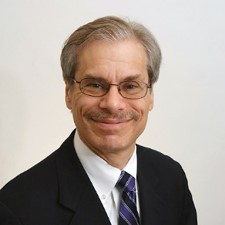
David Felson designated a Robert Dawson Evans Distinguished Professor of Medicine
Congratulations to David Felson, who was named a Robert Dawson Evans Distinguished Professor of Medicine by the Department of Medicine in Boston University.
This honorific designation acknowledges faculty at the professorial rank whose academic achievements have had an exceptional impact on their field in research, education, or clinical care. The award includes a stipend of $125,000 to further support their respective academic programs.
Dr. Felson is one of world’s pre-eminent epidemiologists in osteoarthritis (OA), but occupies a broader role in rheumatology. He has been a champion of rigorous epidemiologic methods. His legacy is best exemplified by his major scientific contributions to the field of osteoarthritis and rheumatology more generally, the numerous trainees and collaborators he has worked with and helped over three decades, his important service to the university and Department of Medicine, and his patients.
Among his contributions in the field of rheumatology are: 1) He was the first to study osteoarthritis, the most common type of arthritis, providing the then novel insight that weight is a major risk factor for knee osteoarthritis; this remains the single most important targetable risk factor for the prevention and management of osteoarthritis. All modern osteoarthritis cohort studies are designed after his first study. 2) He was the first to introduce magnetic resonance imaging (MRI) to the study of knee osteoarthritis. 3) Perhaps his biggest impact has been in the development of the widely used metric for evaluating treatment response in rheumatoid arthritis trials, which is the gold standard outcome measure used by the FDA and other international regulatory agencies, and which has been adapted for numerous other rheumatic diseases. No rheumatologic drug is approved by regulatory agencies worldwide without the outcome measure that he developed.
Dr. Felson’s insights and pursuit of clinically relevant science in rheumatology is complemented by his decades of mentoring to develop the next generation of academic researchers and his service to Boston University School of Medicine. He has mentored numerous individuals who are leaders in their respective fields nationally and internationally who now populate numerous academic institutions across the US and internationally.
Dr. Felson’s contributions have been recognized with prestigious and highest-level awards by the American College of Rheumatology (including as Master of the ACR), the Howley Prize from the Arthritis Foundation (in 2004 and 2020), Osteoarthritis Society Research International, the American Society for Clinical Investigation, and the international Carol Nachman prize in rheumatology. As a testament to his He has also been awarded the Castle Connolly Top Doctor award every year since 2011, an award that is voted by patients and stands as a testament of dedication to, and from, his patients.
We congratulate Dr. Felson on his reception of this distinguished award.
Dr. Felson will be honored during a celebration at the December 21, 2021 Department of Medicine Faculty Meeting.
Megan Bair-Merritt and Tuhina Neogi Recipients of Doris Duke Charitable Foundation Grant
COVID-19 Fund to Support Faculty with Family Caregiving Responsibilities


Megan H. Bair-Merritt, MD, MSCE, professor of pediatrics, and Tuhina Neogi, MD, PhD, professor of medicine and epidemiology, have been awarded a two-year, $550,000 grant funded by the Doris Duke Charitable Foundation through the COVID-19 Fund to Retain Clinical Scientists collaborative. This award was made possible through the support of a grant from the John Templeton Foundation.
The COVID-19 Fund to Retain Clinical Scientists provides grants for U.S. medical schools that are evolving to strengthen policies, practices, and processes to support the research productivity and retention of early-career faculty with family caregiving responsibilities. “Caregiving challenges were magnified during the pandemic but will continue to fuel inequities for the foreseeable future,” says Bair-Merritt. “This grant will provide further momentum in our efforts to implement sustainable efforts that prioritize diversity and normalize caregiving, allowing us to more effectively retain and promote exceptional early-career researchers.”
With this support, Bair-Merritt and Neogi will launch CARE (Creating and Advancing Research Equity) across BUSM. Housed within Boston University’s Clinical and Translational Science Institute (CTSI), the program aims to support, advance, and retain diverse early-career physician scientists who are conducting transformational health research and balancing productivity and caregiving responsibilities by providing career development programs and mentorship necessary to ensure success. The program will contribute to a university-wide culture that normalizes caregiving and prioritizes gender and racial equity.
With additional support provided by departmental leadership, supplemental funding will be available for up to 17 early-career BUSM and BMC investigators conducting clinical research projects. These funds may be used to support research staff such as technicians or coordinators, grant-writing, or to reduce clinical commitment to allow more time for research. In addition to receiving funding, recipients will participate in monthly peer networking meetings, coaching sessions and appropriate CTSI and the Office of Faculty Development career development programs. The BU-CTSI will also provide $5,000 vouchers to each awardee to fund additional research-related resources including staff and supplies.
The culmination of these resources will significantly improve support available to early-career BUSM and BMC investigators with caregiving responsibilities. “CARE Across BUSM strongly aligns with our institutional objectives and efforts to conduct transformational science and to support caregiving and to enhance diversity and equity,” says BUMC Provost and BUSM Dean Karen Antman, MD. “This grant will complement our current and enduring commitments.”
Tuhina Neogi gives the Charles L. Christian, MD, Distinguished Lecture on Highlights in Osteoarthritis as Physician-in-Chief Pro-Tempore
Tuhina Neogi gives the Charles L. Christian, MD, Distinguished Lecture on Highlights in Osteoarthritis as Physician-in-Chief Pro-Tempore at the 103rd Annual Alumni Association Meeting of the Hospital for Special Surgery
Read here the profile article on Tuhina Neogi as it appeared in the September issue of The Rheumatologist
Tuhina Neogi, MD, PhD, Now Alan S. Cohen Professor of Rheumatology at Boston University
By Gretchen Henkel
During a virtual award ceremony in February, Tuhina Neogi, MD, PhD, chief of rheumatology and professor of medicine and epidemiology at Boston University School of Medicine, was celebrated as she was named the Alan S. Cohen Professor of Rheumatology. Dr. Neogi has built a strong national and international reputation as a researcher in osteoarthritis (OA) as well as gout, with over 250 publications to date. She is currently conducting a large, longitudinal study of pain sensitization in those with knee OA, and a large-scale evaluation of crystal deposition in knee OA using dual-energy computed tomography.
Serendipity often plays a role in research breakthroughs, she said when accepting the award. But when “pulling back the curtain” to reveal the components of success, she noted, it’s clear that mentors, leaders and strong collaborations pave the way for scientific advancements. Viewing her prodigious output of journal articles, multiple awards and collegial partnerships with mentors as well as mentees, it’s also clear that purposeful work and intelligence have met with serendipity throughout her education and career.
Foundations of Success
Science was an early interest for Dr. Neogi, and at her public high school in Toronto, she found herself surrounded by peers who were academically oriented and who supported and encouraged each other. “Back when I didn’t know what peer networking was, I already had a successful peer network,” she reflects. Through her friends, she learned about a program that matched high school students with scientists at the University of Toronto.
Accepted into the program, Dr. Neogi spent time each week in the research laboratory of neuroscientist Arthur Roach, PhD, who is now director of research at Parkinson’s UK. During her second year of university undergraduate work, she worked with biochemist Charles Deber, PhD, at the Hospital for Sick Children (also known as SickKids). It was “really exciting,” she says, to participate in research he was doing in cystic fibrosis, recalling her first positive “hit” in a site-directed mutagenesis experiment of the CFTR gene.
In addition to her excitement about laboratory research, clinical medicine beckoned, and she went on to obtain her MD from the University of Toronto in 1998. Her first exposure to clinical research in medical school was with Amit Oza, MD, then an oncologist at the Princess Margaret Hospital, and now head of the Division of Medical Oncology and Hematology at the Ontario Institute for Cancer Research, Toronto.
Later, as a rheumatology fellow, Dr. Neogi worked with pediatric rheumatologist and physician scientist Rae Yeung, MD, PhD, who mentored her through her first presentation when her abstract was accepted at an ACR annual meeting. Before her presentation at the meeting, she recalled, Dr. Yeung accompanied her to the podium, showed her how to advance the slides and—even more importantly—how to lower the microphone to her height. (That was an emblematic moment that Dr. Neogi has carried through, she says, whenever she is mentoring other women.)
Dr. Neogi says that what she most appreciated about all of these early mentors was the fact that they took the time to both teach and encourage her in her pursuits. “Those experiences were very positive,” she says, “I don’t know whether, without them, I would have continued trying to pursue research in my career.”
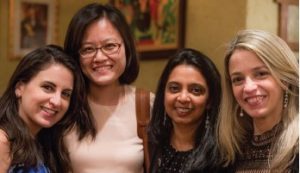 Direction Change
Direction Change
From left: Monica Crespo-Bosque, MD (now faculty at BUSM); MaryAnn Zhang, MD (now faculty at Columbia University); Dr. Neogi; and Ana Vargas Dos Santos, MD, PhD (now faculty at Universidade Estado do Rio de Janeiro, Brazil).
Dr. Neogi’s primary research interest during her rheumatology fellowship was vasculitis, and she fully intended to pursue that path as a basic scientist. However, she encountered another pivotal opportunity: in 2002 she applied for her first grant, a research fellowship award sponsored by the Arthritis Foundation that allowed her to travel to Boston University (BU) for clinical research training.
Interestingly, her first collaboration with David T. Felson, MD, MPH, chief of the clinical epidemiology research and training unit, was his assistance in helping her write that grant that allowed her to obtain training under his mentorship. With the support of the University of Toronto, Dr. Neogi relocated to Boston University, and thrived in the environment of apprenticeship and teamwork fostered by Dr. Felson. She quickly decided, with his encouragement and that of Yuqing Zhang, PhD, to acquire a PhD in epidemiology. Her work advanced from this point, as she began to hone in on research in OA and gout.
In the years since her fellowship, she has had continuous peer-reviewed funding. Her first study on pain in OA was published in BMJ and recognized by the Osteoarthritis Research Society International (OARSI) at its 2009 annual meeting as the leading clinical research paper of the year.1 Multiple awards have followed, including a 2011 OARSI Young Investigator Award and the ACR Henry Kunkel Young Investigator Award in 2014.
Dr. Neogi has been deeply involved with international and regulatory organizations, serving as past chair of the FDA Arthritis Advisory Committee; on the boards of OARSI and the Gout, Hyperuricemia and Crystal-Associated Diseases Network (G-CAN); and on committees for the ACR and the International Association for the Study of Pain (IASP). She has also led ACR treatment guideline development for gout and OA.
Collaborations Abound
Dr. Neogi extolled the teamwork of her section of rheumatology—“we’re like an orchestra, a well-oiled machine,” she says—and praised the unified work ethic they share. “There’s no one single person that outranks everyone else—everyone rolls up their sleeves to get the work done for the success of the whole group.” Dr. Neogi became chief of that section in 2019.
Dr. Neogi has continually expanded collaborations outside of her immediate BU community. For example, she credits Bob Terkeltaub, MD, at the University of California, San Diego, for launching her into gout research. He recommended that she write a gout review for The New England Journal of Medicine, which opened another opportunity for her.2 Now many of her gout and crystal arthritis collaborators are in New Zealand and Europe. Dr. Neogi extended her research in pain sensitization to hand OA through collaboration with Ida Haugen, MD, and her research group in Norway.
Many of her recent collaborations have been with her now-former mentees, including Joshua Stefanik, PT, PhD, Daniel White, PT, PhD, and others. From 2014–19, Dr. Neogi was facilitator and steering committee member for the Mentor Training Program, involved with the development of the training program and facilitating sessions. She has now provided mentorship in musculoskeletal disease-related research for 31 trainees/junior faculty, and has mentored 18 awarded career development grants. She was recognized for her mentoring with the 2016 Robert Dawson Evans Research Mentoring Award, and has received a NIH grant focused on mentoring.
Representation Matters
Dr. Neogi recalled that during her time at the University of Toronto, there were many positive female role models. “It never occurred to me that I wouldn’t be able to do this [work] because all around me I saw women in leadership positions—as the dean of medicine, chair of medicine, or program director—being successful in research, and being nationally and internationally recognized for their work.”
But when she moved to Boston University from Toronto, Dr. Neogi was the only female and sole person of color in the division faculty. Five additional female faculty members are now in the section of rheumatology. There are many programs at the institutional level to increase support of women and faculty from backgrounds underrepresented in medicine, such as the Women’s Leadership Program, a Mid-Career Leadership Program, and an Underrepresented Group (URG) Leadership Program. As New England’s largest safety net hospital, the institution prides itself on serving the underserved. Dr. Neogi serves on the Diversity and Inclusion Advisory Council on the medical campus.
“We have explicit conversations about diversity and equity and how we can best serve our patients,” she says.
In fellowship interviewing, “we’re making strides on how to make our decisions in a less biased manner,” she adds. Applicants are interviewed by at least four different people, including the program director, and standardized questions are used. And, if applicants are identified as being from a background underrepresented in medicine, the faculty selection committee “takes another look,” because research has demonstrated that first impressions are made within 30 seconds and often align with one’s personal similarities.
Keep Options Open
Dr. Neogi is a leader in clinical OA and gout research. Her work has contributed immensely to the understanding of pain and pain mechanisms in OA, the role of bone in OA, as well as exploration of potential therapeutic options such as bisphosphonates and vitamin K; in gout, she has contributed to understanding of potential flare triggers, development of classification criteria, and treatment guidelines.
When asked for her advice to younger rheumatology researchers, she says, “Everyone’s path is different, and I did not have a clear-eyed path to where I am now.” After all, as a rheumatology fellow, she thought she would be a basic scientist and would be specializing in vasculitis. “And so when you see where I am now, a clinical researcher focusing on osteoarthritis and gout, it’s like almost the polar opposite. While we all may have interests when we’re early in our training, you never know where your opportunities and interests may take you. And I think that’s one of the challenges—many people have interests and a focus early on and want to be true to that interest and focus. But that means that they may miss out on opportunities that don’t directly align with that initial interest. So I think it’s important to keep an open mind for where opportunities may lie and new paths may emerge.”
References
- Neogi T, Felson D, Niu J, et al. Association between radiographic features of knee osteoarthritis and pain: Results from two cohort studies. BMJ. 2009 Aug 21;339:b2844.
- Neogi T. Clinical practice. Gout. N Engl J Med. 2011 Feb 3;364(5):443–452.
ACR recognizes Dr. Eugene Kissin as a Change-Maker
Congratulations to Dr. Eugene Kissin, who received recently recognition by the ACR as a Change-Maker
A rheumatology change maker is anyone in the field of rheumatology working to start or support an initiative or intervention, bring a program or idea to reality, or improve the quality of life of a group or community: A true leader, an inspired visionary, or front-line professional willing to do whatever it takes to keep things going. Change makers in rheumatology may work with or for an organization or initiative. Others start movements or organize people on their own. Whatever they do, they think of rheumatology before themselves. They likely do not think that what they do is special or praiseworthy; they are filling a gap that they see.
 Eugene Kissin, MD
Eugene Kissin, MD
Boston University School of Medicine
Dr. Kissin in described as an innovator, and deserved to be recognized as a Rheumatology Change Maker for his pioneering efforts in teaching ultrasound to rheumatology fellows across the American training programs.
- Paul DeMarco, Colleague
Congratulations to Tuhina Neogi, who received an honorary doctorate in the Faculty of Medicine at Lund University

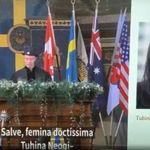
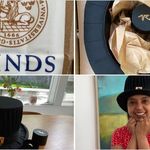
We congratulate Dr. Tuhina Neogi on receiving an honorary doctorate from the University of Lund, Sweden.
below appears a translation from the Lunds universitets doktorspromotion (the handbook from the ceremony):
Tuhina Neogi is a rheumatologist and professor of medicine and epidemiology at the Boston University School of Medicine, and then just over two years back department head of rheumatology at Boston Medical Center. Neogi is one of the world's top clinical trials experts in the arthritis and gout diseases, and she is also a international leading researchers in these fields. Her research focus includes in particular risk factors for osteoarthritis of the knees and gout, and pain mechanisms, but also epidemiological methodological issues relevant to chronic rheumatological diseases is one of her special interests. Neogi is repeatedly prized for its research and already has an impressive scientific output of over 260 publications with over 13 000 citations.
Neogi has for over fifteen years collaborated with researchers at the Faculty of Medicine at Lund University and has contributed significantly to and supported the research environment in clinical epidemiology of motor diseases. She offers a welcome "sounding board" for research in the field through regularly scheduled interaction via video conference. She is also a very popular lecturer and celebrated as a mentor. Tuhina Neogi is extremely respected and appreciated by her surroundings. She is listening, generous and sympathetic. She also has a high level of commitment within a several major international organizations in its field and has, inter alia, role in work on classification criteria for rheumatological disease. Neogi is also a role model for leadership and is a source of inspiration for both younger and older employee.
Boston MCRC 2021 Pilot Grant RFA

Boston Musculoskeletal Clinical Research Collaboratory, a NIAMS funded CCCR, is delighted to announce a Request for Applications (RFA) for Pilot Project Grants.
Key Dates
RFA Release Date: March 1, 2021
Notification of Intent: May 1, 2021
Application Due: June 15, 2021
Funding Start Date: August 1, 2021
Congratulations to Tuhina Neogi, newly installed Alan S. Cohen Professor of Rheumatology
Congratulations to our Section Chief, Dr. Tuhina Neogi for receiving an endowed chair and being named the Alan S. Cohen Professor of Rheumatology. The installation took place via a very well-attended Zoom on Wednesday, February 17.
We look forward to celebrating in person in the near future - congratulations, Dr. Neogi!
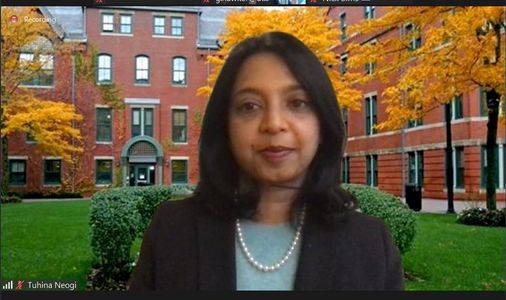
Watch the installation
Tuhina Neogi at Medical Grand Rounds
Medical Grand Rounds
“My Joint Hurts – What Should I Do?” Addressing Common Questions About Managing OA
Friday, January 29, 2021
12:00 – 1:00
Presented by:
Tuhina Neogi, MD, PhD
Professor of Medicine and of Epidemiology
Chief of Rheumatology
Boston University School of Medicine/Boston Medical Center
Boston University School of Public Health
Join Zoom Meeting
https://bostonu.zoom.us/j/98646096079?pwd=RDZpK1I0THc4Z243WmVEQmo4ZGJ0UT09
Meeting ID: 986 4609 6079
Passcode: 032785
Dial by your location
+1 646 876 9923 US (New York)
Find your local number:
https://bostonu.zoom.us/u/ac6iR4zPIJ
Contact: Nicole Nguyen